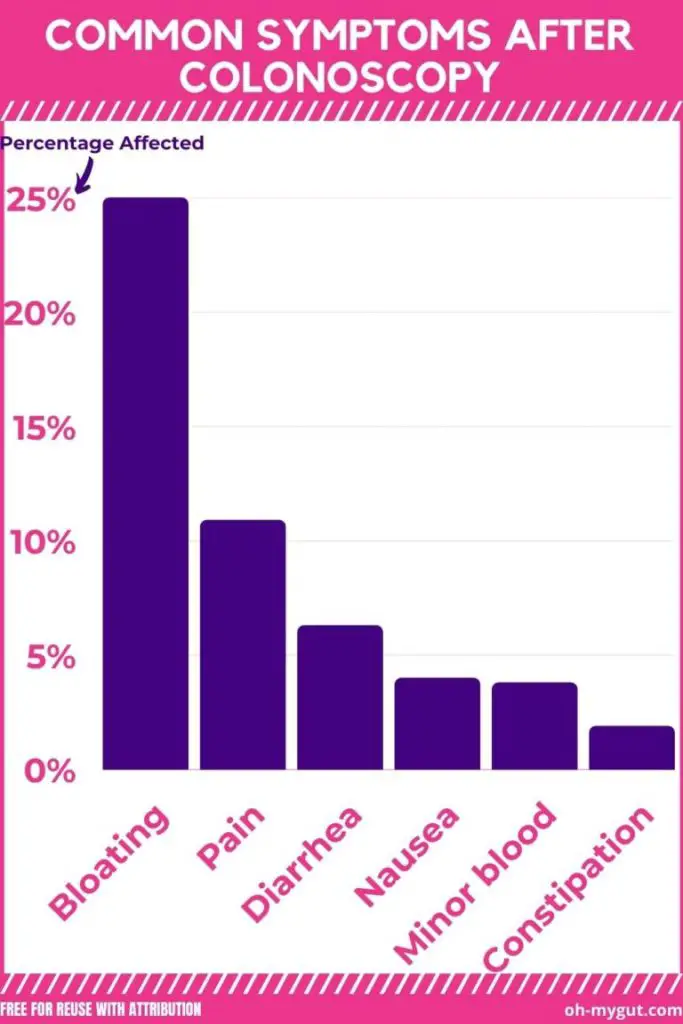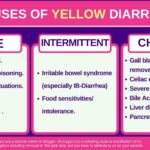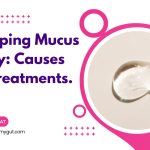Diarrhea after colonoscopy: 5 Causes & treatment (gastroenterologist explain).
Our content is not intended nor recommended as a substitute for medical advice by your doctor. Use for informational purposes only.
According to studies, diarrhea after colonoscopy affects about 6.3% of people under colonoscopy (reference).

Loose stool or diarrhea are considered minor complications. It is usually due to the preparation solutions before colonoscopy. This article will discuss the major causes of acute and chronic diarrhea after colonoscopy.
The two major causes of ACUTE diarrhea after colonoscopy are:
- Colon preparation after effects.
- Infection (enteritis or colitis).
The two major causes of CHRONIC diarrhea after colonoscopy are:
- Persistence of the original bowel disease.
- Disturbance of fecal microbiota.
1- Normal “colon preparation after effect”
Colonoscopy preparations such as MiraLax (Polyethylene glycol) intend to cause diarrhea. So, you should expect to have diarrhea or loose (thin) stools during the intake of colon preparation and after colonoscopy.
Colonoscopy preparation is far the most common cause of diarrhea after colonoscopy (reference).
For how long shall you have diarrhea after a colonoscopy?
Diarrhea from bowel preparation may last for about 1-3 days. If diarrhea lasts for more than three days, it is better to call your doctor.
Colon preparations (such as MiraLax) may also cause side effects as (reference):
- Abdominal pain after colonoscopy.
- Gas and bloating.
- Abdominal discomfort.
- Dehydration and disturbance of your body electrolytes (such as potassium and sodium).
- Nausea.
- Vomiting during or after colonoscopy preparation.
How to deal with post-colonoscopy diarrhea due to colon preparation?
- Avoid using laxatives or other medications that cause diarrhea.
- Avoid fatty and difficult-to-digest foods.
- Drink plenty of water or other fluids to prevent dehydration.
- Avoid alcohol and caffeinated drinks.
- Eat bland, easy-to-digest foods such as BRAT Diet (bananas, rice, apple sauce, and toast).
- Diarrhea or loose stool often resolve after a couple of days. Call your doctor if diarrhea lasts for more than 3 days after colonoscopy.
2- Infection.
The gut or colon infection is rare after colonoscopy, but it happens. The risk increases with certain diseases or procedures such as polyposis, IBD, or polyp removal.
Diarrhea due to infection after colonoscopy tends to be more severe. It can also be associated with systemic symptoms. The following may help you identify infection-related diarrhea:
- The diarrhea is more intense with frequent bowel movements.
- Abdominal cramps are unusually severe.
- Fever may be present, and it can be high grade.
- Muscle aches and fatigue.
- Nausea and vomiting may also occur.
- Passage of mucus or blood in the stool.
Also, a systemic infection may occur due to the leakage of bacteria into your blood (reference).
The infection is predominant during colonoscopy procedures. Common procedures include removing a polyp or taking a biopsy from a colon mass.
What to do if you suspect infection as a cause of diarrhea after a colonoscopy?
- You have to call your doctor if you have signs of inflammatory diarrhea.
- Your doctor may prescribe an antibiotic and antispasmodic medication to treat the infection.
- You should also bear in mind that this is a rare complication. And Antibiotic prophylaxis before a colonoscopy is still not recommended by The Americal Society of Gastrointestinal Endoscopy (ASGE).
- The general tips such as staying hydrated, eating bland food, and avoiding alcohol also helps.
3- Allergy to the disinfecting solution (chemical colitis).
Accidental contamination of the endoscope with a disinfection material called (glutaraldehyde) can result in inflammation of your colon.
However, the condition is less common. Under normal circumstances, The colonoscope is rinsed after sterilization. This is to get rid of such a substance before its usage.
The disinfecting solution causes chemical colitis which results in diarrhea after colonoscopy with severe symptoms such as (reference):
- The symptoms start 1-3 days after colonoscopy.
- Severe abdominal pain (cramps).
- Mucoid and sometimes, bloody diarrhea.
- Rectal bleeding.
- Tenesmus (constant urge to poop, even immediately after bowel movements).
- Nausea or vomiting can occur.
- Fever.
The condition is difficult to diagnose due to:
- the symptoms are similar to infectious colitis, post polypectomy coagulation syndrome, and other causes of colitis.
- There is no specific test to diagnose such a condition and re-endoscopy only reveals non-specific inflammation of the colon mucosa.
The condition is unlikely to happen if the colonoscopy center adheres to the standard disinfection and rinsing protocols.
Call your doctor if your diarrhea shows inflammatory signs (blood, mucus, fever, intense abdominal pain).
4- Persistence of the original cause (chronic or recurrent diarrhea after colonoscopy.
Often, You’re are undergoing colonoscopy for a reason. Some chronic bowel diseases may be the cause of your diarrhea after colonoscopy.
Check if you already have been diagnosed with one of the conditions. The conditions below can be the cause of diarrhea after colonoscopy (rather than the colonoscopy itself):
- Irritable bowel syndrome.
- Celiac disease.
- Crohn’s disease.
- Ulcerative colitis.
- Colorectal cancer.
- Microscopic colitis.
- Bile acid diarrhea.
- Food intolerances Such as lactose intolerance.
- Recurrent Clostridioides difficile diarrhea.
- SIBO (small intestinal bacterial overgrowth).
- And many others.
If you’re already a chronic diarrhea sufferer before colonoscopy, the cause usually persists after colonoscopy.
5- Disturbance of Microbiome (can lead to chronic diarrhea).
We are still don’t understand the gut microbiome well enough. The microbiome is the colonies of beneficial bacteria that live inside your gut (including the colon).
The microbiota helps to:
- Regulate your bowel movements.
- Digest food and nutrients.
- Prevent indigestion, bloating, and abdominal pain.
- Help to fight the bad gut bugs.
- Improve your gut immunity.
Bowel preparation essentially cleans out your entire small and large intestine.
Theoretically, Bowel preparation will push the beneficial microbiome out of your body. Loss of gut microbiota may result in diarrhea after colonoscopy. Diarrhea from microbiome disturbance may become chronic.
However, Current research states the “most” of the microbiota return to your colon within two to four weeks (reference).
We don’t have strong evidence that disturbed gut microbiota leads to post colonoscopy diarrhea.
We still don’t know if it reverts to 100% of its previous condition or less than 100%.
Discuss the issue with your doctor if you have chronic diarrhea after colonoscopy.
Your doctor may prescribe a probiotic for such a case. A probiotic is a living microbiota in the form of tablets or powders. Taking a probiotic may help your colon to restore its normal microbiota. Learn More.
When to see a doctor for diarrhea after a colonoscopy?
- Diarrhea lasting for more than three days after colonoscopy.
- Severe or intolerable abdominal pain.
- Associated severe nausea or vomiting.
- Bloody or mucoid diarrhea.
- Fever.
- Signs of dehydration as extreme thirst, rapid heartbeat, dry mouth, peeing too little, or confusion.
- Evidence-based
- Written by a doctor.

Related Posts:
- 5 Causes of Diarrhea After Eating Fatty Foods & Tips…
- Can I Eat a Burger After a Colonoscopy? And When?
- What Are The Signs Of A Perforated Bowel After A…
- Rice After Colonoscopy: What Type Can You Eat?
- Is Bone Broth Okay Before Colonoscopy? GI Doctor Explains.
- Mucus In Stool With IBS: Causes, Different Colors, &…






